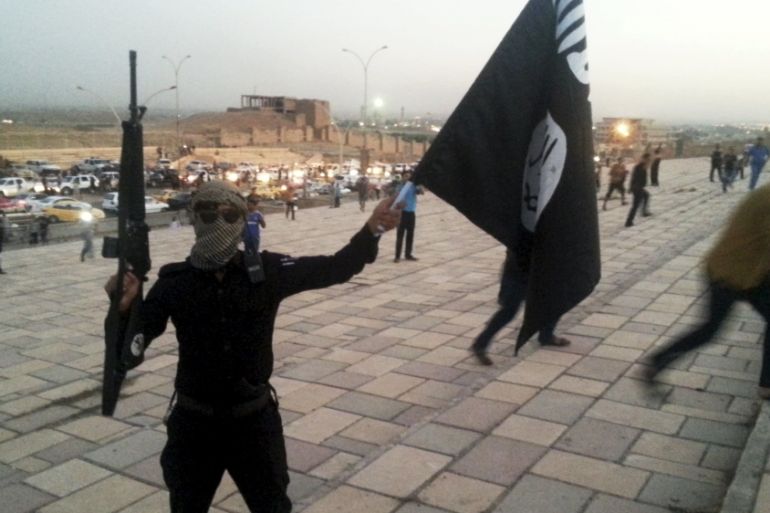Deadly ISIL attack north of Baghdad sparks anger
Iraq’s Salahuddin province in mourning after an attack blamed on ISIL fighters killed 10 people, including four civilians.

Iraq’s Salahuddin province declared three days of mourning on Sunday after a deadly attack blamed on the ISIL (ISIS) armed group, as some criticised the authorities for failing to fight back.
Late Saturday, a roadside bomb hit a civilian car on an open road about 200km (120 miles) north of the capital Baghdad, police and a local official said.
Keep reading
list of 4 itemsIs ISIL resurging amid the coronavirus pandemic?
Sold, whipped and raped: A Yazidi woman remembers ISIL captivity
US military releases data on civilian harm in war on ISIL
When security forces arrived at the scene, ISIL fighters opened fire on them.
The attack killed at least six Iraqi security officers and four civilians, including one who died of his wounds overnight, according to medics.
There was no claim of responsibility by ISIL but both the mayor and police blamed the armed group, which Iraq’s government said it defeated in late 2017.
That victory came after three years of brutal fighting to wrench back the one-third of Iraqi territory that was captured by ISIL in 2014.
Although the fighters no longer hold territory, sleeper cells wage hit-and-run attacks on state infrastructure, particularly in desert areas north of Baghdad.
ISIL also launches attacks on the Iran-backed Hashd al-Shaabi militias, also known as the Popular Mobilisation Forces.
The Hashd al-Shaabi, founded as a loose network of Shia-majority factions, played a crucial role in defeating ISIL alongside the US-led coalition.
‘Repeated failures’
Two weeks ago, 11 people were killed in an ISIL attack on a lookout post in al-Radwaniyah on Baghdad’s outskirts, areas that are predominantly Sunni Muslim.
The attacks have coincided with a new campaign by Iraq’s security forces to arrest fighters in hiding across the country – but some say it has not been enough.
“Iraqi security forces just assured us this area had been cleaned,” wrote Mashaan al-Jaboury, a Sunni MP representing Salahuddin, on Twitter late Saturday.
For Jamal al-Dhari, another Sunni figure, the latest ambush “sheds light on the repeated failures in the fight against terrorism”.
“The government of [Prime Minister] Mustafa al-Kadhimi must seriously put in place a national strategy … and stop being satisfied with ‘investigative committees’,” said Dhari.
Iraqis regularly mock their government for establishing investigative bodies that do not produce results.
The tensions come as the US-led coalition, which helped Iraq fight ISIL starting in 2014, is drawing down its troops.
This year, the US has already shrunk its contribution to the coalition from 5,200 to some 3,000 troops, as other countries reduced their numbers as well.
The US announced last week it would withdraw another 500 soldiers by mid-January. The impact of a US pullout has left many fearing a resurgence of ISIL, as well as the growing influence of Iran in the politically fragile country.